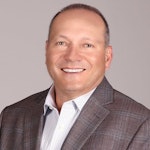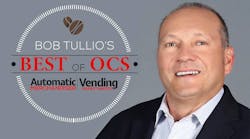Over the past two years, I have been beating the drum for storytelling as a business development tool. I have conducted webinars, spoken at conventions and recently posted a three-part storytelling video series on my b2b Perspective Channel, because I believe that storytelling is a powerful and useful skill.
Since this is a column about the office coffee business, I am going to provide a comprehensive OCS storytelling example. This is a story that I told. I am not making this stuff up!
Story fundamentals
First, let's review the basics:
- Storytelling is proven by science to stimulate 7 areas of the brain instead of just two. Compelling stories have greater impact than facts.
- Your story should be true.
- There needs to be a main character.
- The story structure should have a beginning, a middle and an end.
- Your story should be relevant.
- Do your best to make the story engaging, even compelling.
Storytelling is a powerful way for an account executive to help clients make the right choices. If a client has an idea about how things should happen, but it is obviously a bad direction, there are two ways to deal with the situation:
- You can hit them right between the eyes by telling the client or prospect, “You are making a bad choice and here is why it is a bad choice.”
- Or, you can tell them a story that will help them visualize and better comprehend your position.
An office coffee service story
Backstory:
My client, a fast-rising entertainment entity, wanted to cut back on coffee service expenses because they were spending so much on five-gallon water bottles. To put it in perspective, they were spending $8,000 a month on bottled water and $4,000 per month on coffee service.
Kim, the facility manager, was quite convinced that bottled water was a critical, irreplaceable amenity.
Play by play of the conversation:
Bob: Kim, it is great that your company is so amenity oriented, but which program do you think is more valued by your employees, the coffee service program or the drinking water?
Kim: I think they are both important.
Bob: Kim, may I ask you another question?
Kim: Of course.
Bob: If I can show you a way to reduce your water costs while maintaining the level of quality, could you see yourself taking that savings and making the coffee service program even better?
Kim: Yes, but I don’t see how you can do that. Some of the execs around here will never want to give up bottled water. Filtered water is just not an option.
Bob: I recently met Elmer, a facility manager at a major film studio, who was experiencing the same concerns as you. Much like your company, they literally had walls of bottled water filling their kitchens. Elmer told me that some of her employees were sick of lifting the five-gallon bottles. Do you ever hear any of that Kim?
Kim: Absolutely. I get stuck changing the bottles twice a day in the kitchen near my office.
Bob: I get it. There is another issue that keeps coming up – the environment. Just about everyone agrees that belching delivery trucks transporting bottled water isn’t exactly sustainable. Maybe that has not come up yet at your company?
Kim: It has. We have heard noise about it from our green initiative employee committee.
Bob: I’m not surprised to hear that. I was surprised by what actually motivated Elmer to consider an alternative to their bottled water program. Believe it or not, Elmer was motivated by the office decorator who was hired to revamp some of their older floors.
The designer saw the walls of bottled water in Elmer’s office kitchens and said no way will the new kitchens look like this! You need to find another solution. In fact, Kim, didn’t you tell me that by the end of next year, you will adding several more floors?
Kim: I did. I guess we could be looking at the same situation. That’s why I want to cut costs, because of our continued growth.
Bob: I understand, Elmer had the same concerns. Between those same concerns and the office decorator’s insistence, he came to me to find a solution.
I went on to show Kim how I introduced high-end point-of-use water filtration systems to Elmer’s studio.
Bob: Ultimately, Kim, Elmer saw his drinking water bills reduced by 70%. Not only that, but he was also a hero with human resources because there were no more heavy bottles to lift, no more spillage of water and the studio’s green committee was thrilled by the sustainable solution.
Kim: But what about those key executives that insist on bottled water? How did you satisfy them?
Bob: That was simple, Kim, and we can offer the same solution to you. Any executive who must have bottled water can have it, delivered to their desk every week in 16-fl.oz. bottles and I am going to give you an excellent price per case.
At Elmer’s studio, after a couple of months, only a few executives insisted on having the 16-fl.oz. water bottles, but that was because of conference room needs.
I should also mention that Elmer took the water savings and elevated the coffee service program, adding some nice local roasts, biscotti, premium teas and huge selection of flavored creamers. The employees at Elmer’s studio were thrilled.
I have a question, Kim. Based on what happened at Elmer’s studio, can you see why it makes sense to replace your existing five-gallon bottles with a point-of-use water system in each kitchen, for huge savings, no risk and a better OCS program? Plus, you will be a hero with the HR department and the green initiative employee committee.
Kim: I am willing to give it a try in one of our buildings.
Baby steps
Clearly, Kim took baby steps, but ultimately the conversion to point-of-use water was a huge success. OCS jumped to $8,000 a month, while Kim’s water expense dropped to about $1,000. She agreed to convert the entire program over to point-of-use water and upgrade the OCS program.
Amazingly, this was before today’s impressive water products like FRIIA from Marco Beverage Systems and Elkay’s new Smartwell system. Imagine what is possible today!
Don’t just deliver – engage
As you can see from the story above, storytelling is not a one-sided narrative. Engaging the client or prospect with questions that will help move the process along only adds to the impact of the story.
Use this framework to develop your own arsenal of compelling, relevant and engaging stories of your own.
What is your favorite story? I would love to hear it. Emailing me at [email protected].
About the Author
Industry consultant and Vending Market Watch contributing editor Bob Tullio is a content specialist who advises operators in the convenience services industry on how to build a successful business from the ground up and advises suppliers on how to successfully connect with operators. Tullio’s YouTube channel, b2b Perspective, is designed to “elevate your business in two minutes.” Tullio is currently developing an online course, Leverage the power of LinkedIn to grow your business. Visit tullioB2B.com to learn more about VMW's contributing editor and his b2b services.

Bob Tullio
Bob Tullio is a content specialist, speaker, sales trainer, consultant and contributing editor of Automatic Merchandiser and VendingMarketWatch.com. He advises entrepreneurs on how to build a successful business from the ground up. He specializes in helping suppliers connect with operators in the convenience services industry — coffee service, vending, micro markets and pantry service specifically. He can be reached at 818-261-1758 and [email protected]. Tullio welcomes your feedback.
Subscribe to Automatic Merchandiser’s new podcast, Vending & OCS Nation, which Tullio hosts. Each episode is designed to make your business more profitable.









